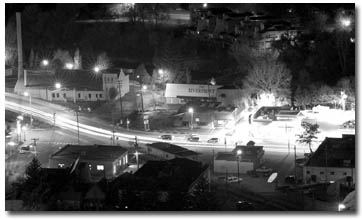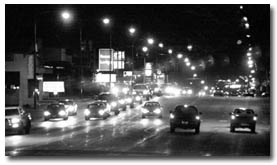| City’s dark sky ordinance would
reduce light pollution
by Jennifer Reeder
Photos by Dustin Bradford.
Clive Barker wrote in Weaveworld
about a darkness so deep that it was like a night devoid of stars.
But here in Durango, it seems the stars are disappearing because
too much light is being cast from street lights, businesses, ball
fields and high-density areas. So at the request of Durango City
Council members, city planners are drafting an ordinance to decrease
light pollution and help the stars become more visible.
 |
| An ordinance being considered
by Durango would reduce light pollution by requiring certain
wattage and light design criteria. |
“It’s probably good to
get it started now while it’s still feasible,” said
Millissa Berry, a city planner.
Berry and other city planners are drafting a code that will call
for light fixtures that direct light down - not out or up - and
avoid excess wattages. Berry said the code might also call for a
light trespass ordinance, which would mean light – even from
inside a building – could not spill onto other properties.
She said that the so-called “dark sky ordinance” –
which should be reviewed and approved by the Planning Commission
and City Council before the end of the year – would most likely
apply to existing structures as well as future development sites,
though there will be a grace period for compliance.
“It may take longer to get the street lights, buildings and
recreational facilities all in line because it could be a significant
cost to the city,” Berry said.
She said that the city is one of Durango’s biggest light polluters
and will have to change hundreds of lights, including street lights,
fixtures at the fairgrounds and the ball field lights at Fort Lewis
College. Commercial areas like Bodo Park, Main Avenue and the Durango
Mall will likely need substantial adjustments as well. Mandatory
changes also will trickle down to small businesses, subdivisions
and in-town housing.
But Berry and others in the community believe the one-time cost
of retrofitting light fixtures will be worthwhile in the long run
when skies regain their clarity.
“FLC has an astronomy department that can barely use their
scopes,” Berry said.
“(Durango) is a small town, but you can see it from Bayfield.”
Ashley Shultz, who teaches astronomy at FLC, said that being able
to see the stars with the naked eye is not the only benefit of a
dark sky ordinance.
“If you use less power and use less light, you save power
and money,” Shultz said. “These kinds of changes really
do pay for themselves.”
Of course, as an astronomer, she also wants a darker sky for star-gazing
reasons. She said at the beginning of an astronomy course, she usually
leads students on a “naked eye sky tour” to show them
some constellations and help them get their bearings. But over her
seven years at the college, it has been increasingly difficult to
locate even obvious constellations because of light pollution, and
she often sends students to more remote areas where the stars are
more conspicuous.
“Essentially what (light pollution) is doing is driving our
astronomy program off campus,” Shultz said.
A natural concern
| For more
information about the dark sky movement, visit www.darksky.org,
or call Kent Ford at 259-1361. |
Dark sky proponent Kent Ford,
owner of Performance Video and a part-owner of Four Corners River
Sports, said that although astronomy is a consideration, it is
not as big a factor as the need to preserve natural values. Ford
said that this area of the United States has some of the clearest
skies in the nation, which would be a shame to lose for locals
and tourists alike.
“The dark sky movement is an easy thing for people to support,
because it really is taking care of our outdoor lighting the same
way that we would take care of our indoor lighting, directing
it where we want to go, using the right amount and not wasting
electricity while we do it,” Ford said. “It’s
a hoop even the large corporate monsters moving into our community
can jump through relatively easily.”
But Ford was quick to stress that there is no single culprit.
“It’s not the sort of thing where we could make a
blanket statement of who’s the troublemaker here,”
Ford said. “We’re all in it, and we’re all in
it because we just haven’t carefully considered what we’re
doing.”
He said that the city has already made moves to cut down on light
pollution, such as installing light fixtures at the recreation
center with “full cutoff design,” which means the
bulbs don’t hang below the covers.
Ironically, La Plata Electric Association was one of the first
proponents of the dark sky initiative and hosted meetings about
the issue prior to it coming before the council.
“We don’t just encourage the sale of electricity;
we encourage its wise use,” said David Waller, spokesman
for LPEA. “And our members want it, and we’re in the
business to serve our members.”
At what cost?
 |
| Street lights, such as these
on North Main Avenue, would require retrofitting under the
city’s dark sky ordinance so light is cast down and
not up and out. |
Though there wasn’t any
opposition to the dark sky initiative when City Council discussed
it in a neighborhood meeting Sept. 30, there is bound to be if
the ordinance is approved and businesses receive notices to comply
or face penalties such as daily fines.
For example, although outdoor lights at Francisco’s Restaurante
y Cantina only illuminate the restaurant, they would have to be
changed because they are aimed up at the sky.
Skip Garcia, general manager at Francisco’s, said he would
hope for a grandfather clause for existing businesses.
“It’s always expensive any time you have to change
lighting,” he said. “I really don’t see how
the city can enact an ordinance that’s going to change existing
building ordinances. The old (businesses) that have always abided
by ordinances shouldn’t have to change their designs.”
He said it is important for the restaurant, like all businesses,
to remain prominent at night to draw customers.
Still, “I guess the city’s always done what they want
to do,” Garcia said.
Lighting changes have already been made to the Main Avenue Burger
King in order to comply with a different city ordinance, but more
would have to be made if the new dark sky ordinance is approved.
“I think it’s just a big old pain in the butt,”
said Jennifer Chavez, a night manager at Burger King. “The
stars are pretty and everything, but people have to make money.”
She said that if the lights in the parking lot had to be torn
down and replaced, rewiring the lines under the parking lot would
be very expensive – an expense that seems unnecessary to
her.
“You can go up on a dark hill,” Chavez said. “It’s
not like you’re going to go out in the parking lot at Burger
King to look at stars.”
However, like other dark sky proponents, Durango Mayor pro-tem
Virginia Castro contends that the changes will be cost efficient
in the long run as businesses save money on electricity. She said
that the real value of the ordinance would be realized further
down the road when there’s more development and growth in
the area.
“With so much building going on, it’s good to have
something set up in place before they’re constructed,”
Castro said.
She said that her fellow City Council members seem very receptive
to the dark sky ordinance.
“I think we all see the value of being able to see the night
sky – for the illumination of the stars and planets to be
visible with the naked eye,” Castro said. “My main
motivation is that it is very beneficial for people to be able
to see the stars at night and put their whole life in perspective.”
|

